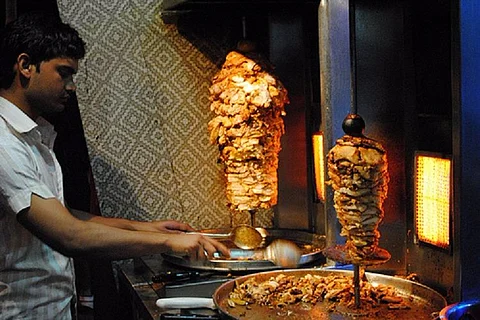

With four people hospitalised two with food poisoning, tainted shawarma is again in the public glare in Kozhikode.
The four customers told officials that they had eaten shawarma rolls from a bakery near the Kozhikode Medical College on Saturday, and were admitted to the hospital on Sunday.
After locals protested in front of Ojin bakery, the store was closed down by the officials.
“We have sent food samples for testing, following which necessary action will be taken against the bakery. For now, we have served a notice for the bakery to be shut temporarily, pending investigation. We found stale meat and also found that the mayonnaise that is used for preparing the shawarma was not stored at a low temperature, which makes it highly vulnerable for contamination,” said Sankaran Unni, Assistant Commissioner of the Food Safety Standards Authority of India (Kozhikode).
Shawarma stalls are generally set up as extensions of eateries, with the shawarma grill placed outside the premises, by the roadside. Officials say that an eatery does not need a specific license for a shawarma stall.
“A bakery is supposed to get an additional license to run a shawarma stall under the category of prepared foods. But while applying for the license, they needn’t specify what the item prepared will be, which means there are no specific rules pertaining to the running of a shawarma stall in particular,” Sankaran Unni said.
Ashraffuddhien, Joint Commissioner (Enforcement), said that clamping down on sub-standard Shawarma stalls has been a priority in Thiruvananthapuram and in Kochi for the last few years. In 2012, a 21-year-old man had died after consuming shawarma from an eatery in Thiruvananthapuram, throwing up a new challenge for officials.
“At the time there were more than 200 Shawarma stalls in Thiruvananthapuram city. Apart from not maintaining hygiene, we found that many stalls mixed rotten meat with fresh meat, so that they can sell off the rotten meat. In the last four years, we have been regularly conducting inspections,” Ashraffudhien said.
After the 21-year-old’s death, which sent shockwaves across the state, the food safety department made it mandatory for all shawarma stalls to be enclosed within a glass compartment.
“The burner emits heat of at least 300 degree Celsius which will make the entire room hot. That is why the burner is always placed outside the eatery. But unlike foreign countries where pollution is less, the situation in Kerala is different. There is pollution from vehicles and the dust in the air, which is sure to contaminate any food prepared in an open space. It is then that we made glass compartments mandatory, to protect the burners from outside contamination,” Ashraffuddhien said.
He added that after quality standards began to be monitored and enforced more strictly, the number of shawarma stalls in the city dropped to around 125 mainly due to the inability of others to maintain quality standards.
“After we fined eateries for lack of hygiene or using bad meat, they would follow the rules for a few months, but would begin to compromise on quality after the initial enthusiasm. Eatery owners complain that they are not able to meet the quality standards with the price they sell the food item for. It is when the eatery gets crowded that they pass off old meat. Some eateries have also closed down for the lack of employees to run the place,” he added.
Sankaran Unni points out that though most Shawarma stalls in Kozhikode follow the guideline to set up glass compartments, it is often the quality of the meat and not necessarily the technique of preparation that is problematic.
“They marinate the meat for more than four hours before actually cooking it. So when we go on inspections, we know that the meat is four hours old. But this meat often turns out to be days’ old when tested,” he said.
Ashraffudhien says that it is not the lack of stringent rules but the gap in implementing them, that makes their job challenging.
“Guidelines and regulations are laid down according to the food safety act, on how an eatery should be maintained. But it is the implementation stage that is problematic. Though we work to ensure hygiene and good practices at eateries, there is hardly any mechanism to check the quality of meat at the source, at slaughter houses,” he said.
(Edited by Rakesh Mehar)